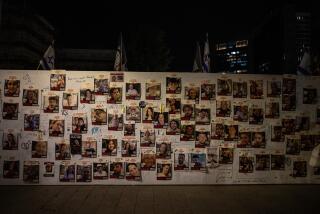COLUMN LEFT : West Pretends to the Mantle of Morality : ‘Our’ violence is rational response; theirs is ‘terrorism.’
- Share via
The phrase “the fog of war” comes to us from the great German military thinker Karl von Clausewitz. The Gulf War, despite being the focus of unprecedented media attention, remains in a heavy shroud of fog.
But one aspect of this fog Clausewitz did not consider: the thick cloud of moral hypocrisy that a modern democratic state cranks out on its own behalf, especially in wartime. In some ways, direct censorship of war coverage is far less distorting for the public than is the overall complicity by the media in the falsification of moral reality.
This process of falsification has deep roots. The Cold War, in its length and in the depth of public support, was the shaping political experience. It inclined both the bureaucracy and the media to consider that “a state of war,” or at least an atmosphere of constant readiness for major war, was a condition of normalcy.
In the 1980s, the government set about to prepare society for the end of the Cold War by gradually replacing “the communist menace” with “the terrorist menace.” The primary evil was now the political violence of social forces hostile to the United States: “terrorism.” At the same time, this ideological classification served to justify and sanitize violent practices conducted by the United States to further foreign policy. In turn, primed by the Cold War, the public was encouraged to vent its wrath and fear by endorsing, without regard for law or morality, all forms of counterterrorism. If adversaries discovered ways to disrupt American norms of order by violent tactics, then the government, especially the CIA, might engage in comparable activity, described with a certain pride as “covert operations.”
Such political language and ethics have had a profound effect on our perception of moral and political issues. Hypocrisy is invited on our side, and bitter resentment on the receiving end. These factors are present in a dramatic form in the Gulf War.
Despite the stated care to avoid civilians, the impact of the coalition’s massive, persistent bombing has imposed great suffering on Iraqi civilian society. With the technological imbalance also showing up in military casualties and damage, Iraq, despite its massive modern weaponry, appears as a helpless victim in the combat zone.
This exercise in hyper-modern warfare recalls to the Arab world in particular, and the Third World in general, that the West remains in geopolitical control on a global scale, ready to unleash limitless violence if its access to resources like oil appears under threat.
Iraq has found its own unconventional, horrible ways to hit back: instigating violence against coalition assets, threatening recourse to chemical weaponry, directing its crude Scuds against Israeli and Saudi cities, fouling the Gulf with oil. Such tactics do affront our sense of decency, but are they truly more reprehensible than raining death and destruction from the skies in almost limitless quantities?
We need to ask ourselves if there is justification for the sharp contrast between their tactics as so many varieties of terrorism and our tactics as more or less effective military options. Recently, top policy-makers have speculated in public about the possible use of nuclear weapons in retaliation against a chemical attack or to spare American lives in what might otherwise be a costly ground war, seemingly reducing the choice to one of cost-benefit analysis. Of course, American lives are precious, and political leaders have a duty to minimize casualties, but does not this kind of reasoning verge on terrorism when the whole of Iraqi society is subjected to devastation so as to avoid the perils of a ground campaign in Kuwait?
There is a gross distortion of perception if it becomes a “legitimate” combat tactic for the United States and its allies to use their high-tech war machine to destroy the entirety of Iraqi society, but it is “terrorism” for Iraq to strike back by the limited means at its disposal. It is self-deceiving distortion to call the Scud a terror weapon, but not the B-52. It is a far worse moral manipulation to treat the decision to use nuclear weapons as an essentially military decision, but to condemn chemical weaponry as a descent into the realm of terrorism. We should observe with alarm that with the removal from the political scene of the Soviet deterrent, American thinking about its own weaponry of mass destruction has shifted back in the direction of the pre-Hiroshima cast of mind.
If we maneuver ourselves into believing that high-tech methods of political violence are “war,” but lower-tech responses are “terrorism,” we will be inviting the deepest sort of rift between Islam and the West, and, indeed, with the non-Western World as a whole. Such tensions could easily degenerate into a new kind of cold war with extremely volatile racial and religious overtones.
More to Read
Sign up for Essential California
The most important California stories and recommendations in your inbox every morning.
You may occasionally receive promotional content from the Los Angeles Times.












